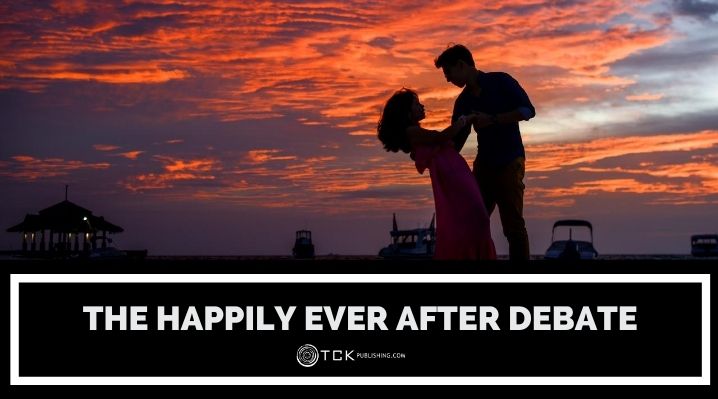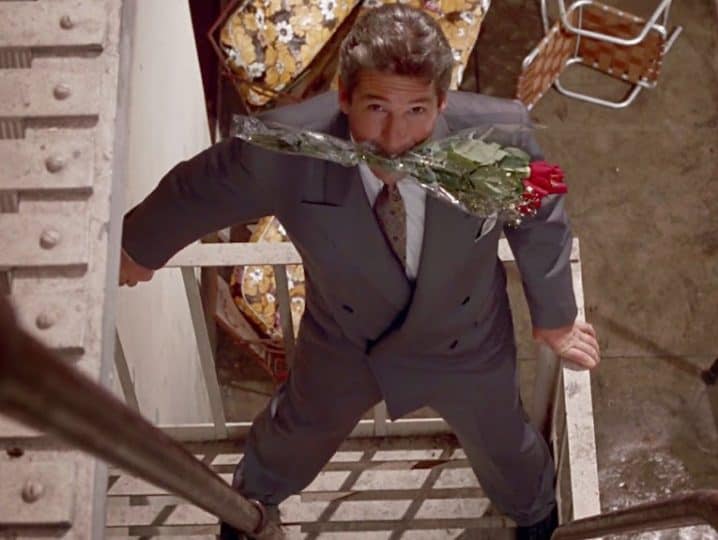
Open to the last page of any children’s fairy tale, and you’re likely to see words and images describing the protagonists, who have likely just overcome unimaginable odds, going on to live together “happily ever after.”
Often, you’ll see those exact words on the page, just to make sure we get the point: there will be no more trouble in Neverland, and nothing will ever come between the main characters again. And as we get older, we see this idea reproduced over and over again in the books we read and the movies we watch, especially in those that are considered romances.
In fact, most die-hard romance fans would say that a book or film can’t truly be considered a romance if there’s no HEA. But is this really the case?
What Is an HEA?
HEA stands for “happily ever after.” You know, that part at the end of a story when the happy couple rides off into the sunset, presumably never to be torn apart again? Or when they realize that their quarrel was all just a hilarious misunderstanding? How about when our heroine finally sees that her kind-of dorky best friend really IS the one for her?
While happy endings can be found across virtually all genres—like when the world gets saved from aliens, or the cure for a deadly disease is finally discovered—the “happily ever after” is most typical of the romance genre.
Do All Romances Need a Happily Ever After?
Many romance lovers will argue that there’s an unspoken agreement between the readers and authors of romantic novels: an agreement that, no matter what kinds of ups and downs the author puts you through, the outcome will be positive.
According to the Romance Writers of America, that agreement forms the very foundation of their genre. They assert that every romance novel contains two basic elements: 1) a central love story; and 2) an “emotionally satisfying and optimistic ending.”
In many ways, this expectation is understandable. If you’ve just had a bad day, week, or month, shouldn’t there be at least one genre you can count on to give you some happy news and remind you that love can conquer all?

It’s great to be reminded of that, and to feel the warm and fuzzies of a Pretty Woman ending. But if you’ve ever actually been in love (and yes, loving from afar/unrequited love counts here), then you know that love can be a rollercoaster, sometimes with more downs than ups. (It’s called being lovesick for a reason!)
If you do know that feeling, and especially if you’re feeling it right now, it might be more comforting to know that not every romance lives to see the light of day—but that doesn’t mean the love was any less real or meaningful.
Think about it: if you’ve just had your heart broken, do you really want to read a story about Harry and Sally laughing their way off to a happily ever after? In such cases, an ending more along the lines of The Way We Were might be in order. You want to know that you’re not alone, that heartache is a tale as old as time, and yet we all continue to breathe anyway.
So what exactly constitutes an “emotionally satisfying and optimistic ending”? Couldn’t it be “emotionally satisfying” to see old lovers finally experience closure, even if they don’t end up together? Isn’t it “optimistic” to believe that even if they go their separate ways, they can still find happiness (and even love) elsewhere in their lives?
At least that’s how I see it. Now, that’s not to say I think happy endings are bad; plenty of people really do end up together forever, with relatively few complications in their lives. But that’s certainly not how all—or even a majority—of romances end, which is why it seems appropriate that the stories we read reflect that reality (at least some of the time!).
Romances vs. Love Stories
Those who believe that happy endings are a requirement for true romance stories often make the argument that not all love stories are romances.
This makes sense, if you consider some of the most celebrated love stories of the page, stage, and screen: Romeo and Juliet is really a tragedy; Rhett Butler and Scarlet O’Hara part ways in the historical novel that is Gone With the Wind; and in real life, we know that even Liz Taylor and Richard Burton, the “marriage of the century,” just couldn’t make it work in the end.
As another example, let’s pretend that Jack managed to survive the sinking of the Titanic. (There was so much room on that door!!!)
He and Rose might get married and stay together forever. But that doesn’t mean one of them won’t get sick, lose a job, or even be unfaithful. And let’s not forget all the other challenges they’d face, what with the social shame Rose would face for marrying below her class, not to mention her monster of a mother, who would probably disown her.
Of course, we know that Rose didn’t move her bum over to make room on that door, and Jack ended up freezing to death in the Atlantic ocean. No happily ever after for their love story. But we also know that Rose went on to live a fulfilling life, eventually marrying, traveling the world, raising children, and learning to ride horses.
None of the couples mentioned above got a happily ever after, but their unforgettable love stories continue to inspire lovers and poets around the world.
That’s because, even if some of these stories all take place in extreme conditions, like the middle of a war or a cold family feud, they’re still relatable. Sure there’s epic love and passion, but there’s also loss, heartache, and struggle.
Their bittersweet (or just plain bitter) conclusions mimic the way love often behaves in real life: messily, but we usually end up okay in the end.
Happy for Now: A Happy Compromise?
So perhaps the biggest issue surrounding HEAs for many of us more skeptical readers is not that the couple ends up together, and on a happy note—it’s the notion that they’re going to be happy ever after.
In acknowledgment of the fact that even happy couples aren’t happy all the time, many in the romance community have embraced the concept of ah “HFN,” or “happy for now” ending. These conclusions offer unclear futures for the protagonists: they’re positive and bright, but also realistic. They don’t promise more than what they can deliver.
The HFN tells us that things are happy now, while gently reminding us that tomorrow isn’t guaranteed, so we’d better enjoy today—and I think that’s excellent advice not only for fictional characters, but for all of us in the real world, too.
What’s your take on the HEA? Are stories better when they have a happily ever after? Share your thoughts in the comments below!
If you enjoyed this post, then you might also like:
- Clichés: What Are They and How Can You Avoid Them?
- How to End Your Book: 5 Steps to Writing a Fantastic Final Chapter
- What Is a Denouement? How to Tie Up Your Story’s Loose Ends
- The Problem with Perfect Characters: Mary Sues, Gary Stus, and Other Abominations
As a blog writer for TCK Publishing, Kaelyn loves crafting fun and helpful content for writers, readers, and creative minds alike. She has a degree in International Affairs with a minor in Italian Studies, but her true passion has always been writing. Working remotely allows her to do even more of the things she loves, like traveling, cooking, and spending time with her family.

I recently published an urban fantasy with elements of love and romance. The story is about the intertwined lives of two throuples separated by a generation. One of my beta readers got mad when I killed off one of the younger generation’s characters. “Why did it have to be her?” she said. I brought her back as a ghost. Doesn’t that count? And they did live happily ever after. I had several readers complain that it was too fast–too over and done with, i.e. I didn’t give the readers a chance to mourn. I ended up writing in a funeral service and grieving time. As much as I don’t personally like the HEA expectation, I do understand it. I like your distinction between love stories and romance; they are not necessarily the same thing. Many a love story ends in tragedy or heartache. When I started writing, I had no idea of reader expectations and genres. It’s been eye-opening.
I fail to understand the purpose in trying to allow unhappy endings in romance novels. Why? Those books already exist and are already sold in other categories. Why should the romance genre need to include them too? Who is that serving? Writers who want to tap into a lucrative market but don’t want to write happy endings? It’s not cancel culture to say a romance novel must end happily, and it’s not about RWA; it’s about what readers want and are led to believe they are getting when they buy a romance novel.
The tone of this article makes it sound like the author is someone who isn’t really into reading romance novels and is not very familiar with the genre. In particular, the examples of cliche happy endings and comparisons to movies like Pretty Women paint a stereotype of the genre, rather than commenting on what these novels are actually like.
I love romance novels. I don’t want a tragic ending in my romance novels. Knowing that an HEA is guaranteed gives me a safe space to explore all manner of emotional journeys while trusting that I am not going to be devestated with the ending. Most of the romance community seems to feel similarly from what I’ve seen.
When I read a book sold as a romance novel that does not have an HEA, I feel cheated. It seems like the author was just capitalizing on the romance label to sell more books but couldn’t be bothered to care about what romance readers actually want.
At the end of the day the genre label is there to let the consumer know what kind of book they are buying, and for romance consumers, it’s a love story with an HEA/HFN. There are already genres featuring love stories lacking an HEA/HFN, literally any other genre besides romance.
Hi Melly, thanks for sharing your view! :) I totally respect and understand your opinion regarding HEAs in romance. To your point, I actually conceded in the article that happy endings help guide readers by giving them an idea of what they can expect when they pick up a romance novel. In the points of this article where I expressed my own opinion, I made the case for a “happy for now” ending. But I totally understand that many romance readers count on an HEA, and it remains an integral part of the genre.
I think the romance genre should be spilt for formulaic HEA and other romance novels. This cancel culture saying that romances must be HEA is insane. I’m an indie romance author and I just can’t even deal with the ridiculousness of the Romance Writers of America wanting to shove their McDonald’s brand of romance down our throats The world has gone insane and or become very poorly educated.
Thanks for sharing your view on the HEA debate, Afia! I tend to agree with you when it comes to reading romance. The split you propose sounds interesting!